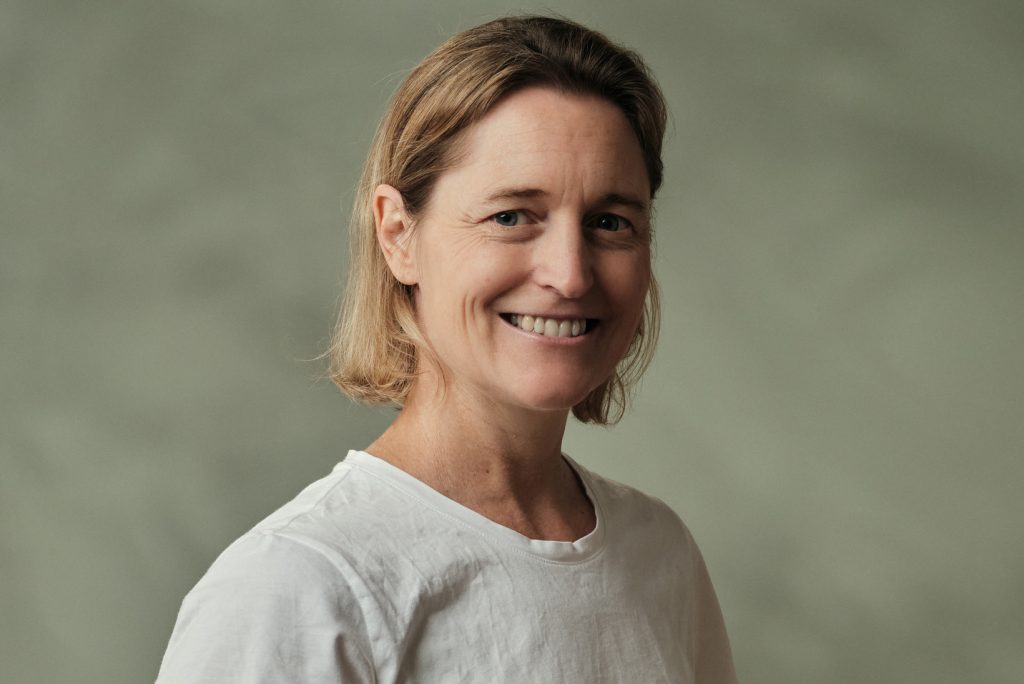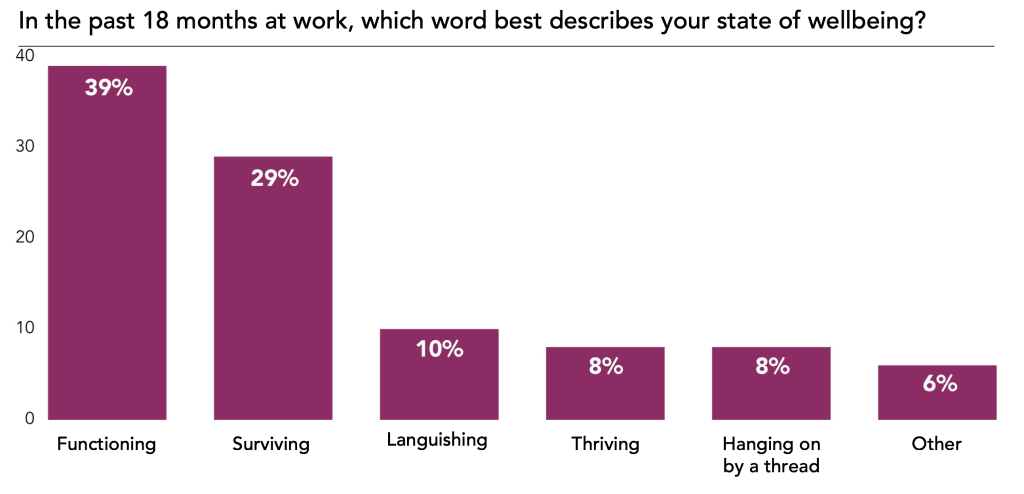November 7, 2023
If Emma Pudney was to use the metaphor of nails in a coffin to explain her exit from corporate life, one alarming incident comes to mind.
After signing a global contract with a telecommunications giant in Japan – following more than 12 months of concept work and planning – the then CTO took the lead in kick-starting the project and shaping the technical integration strategy.
As an experienced and respected technology leader of more than 20 years, this type of engagement was commonplace for the Sydney-based executive.
“Six months pregnant, I flew to the US but I was sick before I left,” Emma recalled. “It was a time when you didn’t get Business Class or even Premium Economy seats so I had massive backache from the flight.”

Following an arduous trans-Pacific flight, an exhausted Emma presented to the executive leadership team (ELT) on the execution strategy required and the next steps for the business to implement. The stakes were high, the pressure was palpable.
“But I was sick and I remember after the presentation, one of the girls in the room saying, ‘Emma, do you know you’ve got a nosebleed?’ she said.
After taking “a bit of a sick day” – a challenging task to accommodate given the back-to-back nature of overseas business travel – Emma powered through, setting the alarm for 4am to catch her connecting flight to Minneapolis, and then onto Japan.
Still not recovered – and about two thirds of the way through that first flight – Emma stood up.
“That’s the last thing I remember,” she shared. “The next was someone going, ‘are you okay, dear?’
“I’d fallen on my stomach, six months pregnant, down the aisle of the plane. I was just so lucky that a person sitting in Business Class happened to be an emergency ward nurse who helped me through the flight. All I wanted to know was whether my baby was okay.”
Saved by the short distance of the connecting flight, Emma was escorted off the plane and travelled at pace across the tarmac in an ambulance. It was the weekend in the US and the middle of the night at home in Sydney.
“I didn’t call my husband or interrupt anyone,” she added. “I let myself cry for five minutes then I became tough.”
Despite such a scare – in which mother and unborn baby were both unharmed – Emma carried onto Japan and launched the project.
“I did have an expensive piece of carrot cake at the hotel because I thought just in that moment, I was worth it,” she said.
Under duress or self-inflicted?
While Emma was quick to clarify that she wasn’t under any form of corporate duress at the time of the decision – there was no suggestion of executive force or coercion to continue – she did acknowledge a toxic cocktail of factors which led to her collapse.
“I didn’t give myself a choice,” she acknowledged.
In holding a perfectionist and high-achiever type personality – traced back to her early days as a child – Emma doesn’t have a stop button. A stop button in the sense of housing a strong desire to continually prove herself and work beyond what is considered healthy or normal.
“Six months pregnant, I flew to the US but I was sick before I left. It was a time when you didn’t get Business Class or even Premium Economy seats so I had massive backache from the flight”
At school, Emma studied to the extreme – “way more than any kid really should and something I won’t encourage my daughter to do” – and carried this excessive approach into the corporate world.
“I have this innate behaviour which I’m working on from a personal development perspective,” she accepted. “But when that was paired with an environment that was either neutral or placed pressure on me, that wasn’t a good combination for my health. So to ensure that didn’t happen again, I exited the ecosystem altogether.”
That is an important distinction. Just because a company isn’t openly pushing employees to the edge or proactively working staff to the bone, inaction can also create unhealthy and debilitating environments.
This might have been a personality trait but it wasn’t self-inflicted.
“I know lots of women in very senior roles at the top levels of large technology organisations in Australia that have reached similar points and the language is the same, they all want out,” Emma claimed. “It’s a Venn diagram with a lot of overlapping issues and different scenarios and motivations but the line is the same, ‘nah, this is no longer fun’.”
Not having fun is okay, by the way. Work doesn’t always have to be fun. When the fun goes and no deep-rooted connection or purpose exists however, that’s when there’s usually no motivation left to play the corporate game.
“I’ve never heard anyone who’s retired say, ‘jeez, I wish I spent more time at work’,” Emma challenged.
According to the Voice of Women at Work 2023 findings, 50% of women have considered changing careers and leaving the technology industry during the past 18 months.
Published by Women Rising, the survey of 1200 female executives paints a worrying picture in the sector. The vast majority of women (92%) are not thriving at work with almost half (42%) are either surviving, hanging on by a thread, or burnt out. Many women (39%) describe themselves simply as functioning.

“Part of it is simply working your ass off and feeling that nobody actually cares about that,” Emma said. “Companies expect you to kill a little bit of your soul each day to ensure shareholders get a return.
“But if I’m working my ass off then I want it to be for something very purpose driven. I want to feel that I’m doing good. I want to be appreciated. I want to be respected.”
When starting out during the early 2000s, Emma was young, enthusiastic and energetic – “I had all the ambition in the world”.
While she is still all of those things, this was a time in her career when chronic working was accepted and expected. Yes, tiredness kicked in but responsibilities were minimal with no children so following the tried and trusted method was easy – Eat, Sleep, Work, Repeat.
And don’t forget to enjoy the well-earned promotions and pay rises that come with it… blah, blah, blah.
“You become more senior and everything is different,” Emma explained. “The style of work you’re doing, the responsibilities that you have and the type of stress placed upon you.”
The anxiety starts with, can you finish this project in time for the client? Then it shifts to… if we don’t finish this project and we don’t hit our strategic plan, there won’t be any bonuses and we may have to let people go.
“It’s a very different kind of stress and as you advance, there is less padding between you and whatever is putting the pressure on the organisation to perform,” Emma cautioned.
Then somewhere in the middle of all that jazz, responsibilities in life begin to accumulate and perspectives change. What is important changes.
The spare time previously reserved for recuperation is now taken up by children in the form of school activities and weekend engagements. Suddenly, there’s nowhere to turn.
“It just wears on you,” Emma said. “Being exposed to that type of pressure is actually fine if that leadership style gels with you and drives energy. But if it doesn’t, then it sucks more energy out of you.”
But it’s hard to avoid and is even addictive given the good money on the table, not to mention the flashy title to show off on LinkedIn.
Even now – months after officially leaving corporate life in July – Emma has been momentarily seduced by a few unsolicited taps on the shoulder.
“I don’t need the glory,” she clarified. “I treasure flexibility, time and a lack of pressure over money and prestige.
“Maybe women tend to be more open about how they’re feeling and are willing to share that vulnerability but I think there’s a lot of men who are also unhappy. Maybe they’re just not willing to admit it.”
“I know lots of women in very senior roles at the top levels of large technology organisations in Australia that have reached similar points and the language is the same, they all want out”
For Emma, one of the reasons why the technology industry is not an enjoyable place to work – especially where the air is thin at senior leadership level – is because of a striking gender imbalance within the boardroom.
Male qualities dominate the market, chiefly centred around demonstrating strength, authority and an unbreakable drive.
“Could we not balance it out with some female qualities?” Emma asked. “It would produce an ecosystem that’s a little more human. It’s severely lacking leadership styles that include vulnerability and the ability to balance shareholder return with purpose and human well-being.”
That doesn’t mean weakness. Emma is not weak – “it just means a different approach to delivering the outcomes”.
Inspiring tomorrow’s tech ninjas
Since leaving the enterprise, Emma pondered a passion that had always lingered, a passion that had been “trapped under the responsibilities of an executive role”.
As a strong advocate for gender diversity and inclusion (D&I), Emma is no stranger to inspiring the next-generation of female talent. But on reflection, the impact of speaking on panels at events is limited to usually 24-48 hours of the audience feeling inspired and motivated.
Plus, the focus is often on women already within the technology sector or transitioning from other careers into the industry.
“But the real challenge starts earlier,” Emma advised. “We need to inspire young girls about technology careers before stereotypes, media and family members shape their young and impressionable minds.”
Hence the launch of Tech Career Paths 4 Girls, a new initiative designed to inspire young girls to explore technology careers.
“I understand the moral dilemma of me feeling great that I’ve just escaped the technology industry and here I am, trying to persuade young girls to join,” Emma recognised. “But I genuinely believe with all my soul that technology will change for the better if we have more young girls entering the industry.”
Targeting girls aged between 11 and 13 years old, the four-session program includes a unique “build your own career adventure” platform allowing students to explore new opportunities within technology by selecting what to study, which projects to tackle and what roles to explore.
This is supported by immersive video content which features real-world female technology experts, industry trivia and impactful project examples.
Plus, unique workshops presented as adventure cyber mysteries and guided by fictional character Shelly Baker, who leads a double life. By day, she’s an expert in the med-tech field, excelling in data science. At night, she transforms into Snow Leopard, solving cyber mysteries and crimes.

“I call this our bolognese strategy because all of this technology is wrapped up inside a cyber mystery which is the same way us parents hide vegetables in the sauce for our kids,” Emma added.
In 2023, just 1.6% of girls will pursue technology studies compared to 6.3% of boys across Australia. Delving deeper, the local technology industry is growing at a rate of 4X faster than average but only 29% of Australians in technology are currently women.
According to Emma, the top three reasons why are:
“We’ll also be running the program for boys in the future because it’s just as important to influence the next-generation of men,” Emma confirmed. “We’re gradually and gradually trying to change the technology industry.”
If the participation of women in the technology industry is significantly boosted, Emma said the domino effect will be improved financial independence across the country.
Financially speaking, women in Australia currently:
“Also, technology companies will perform better if we boost the participation of women,” Emma added. “Studies prove gender diverse company perform better financially, have greater productivity, stay on schedule and budget and have better employee performance.”
Inform your opinion with executive guidance, in-depth analysis and business commentary.